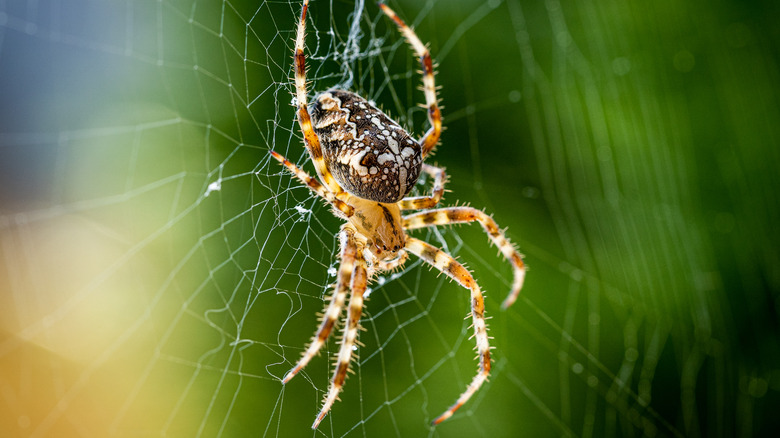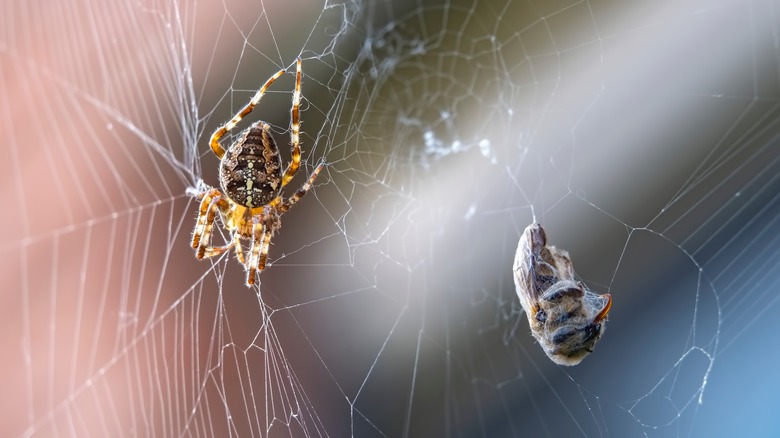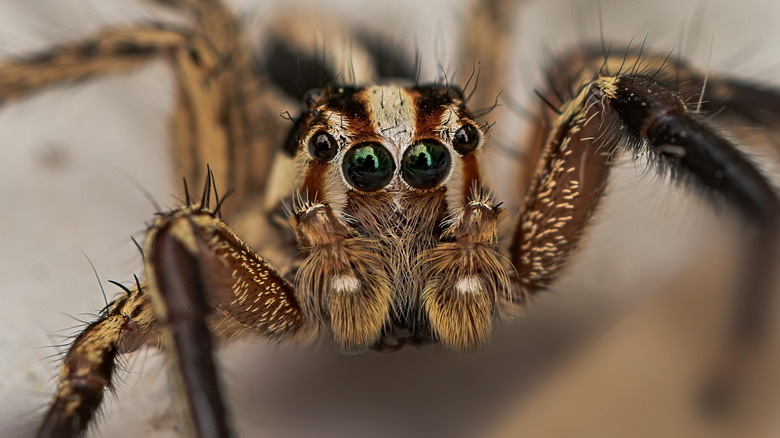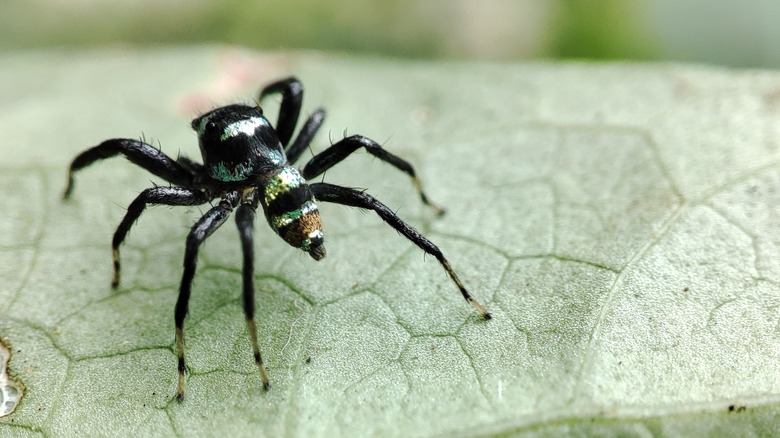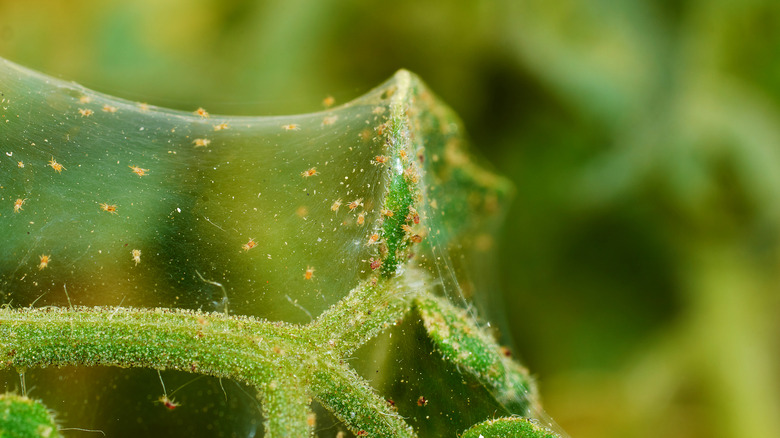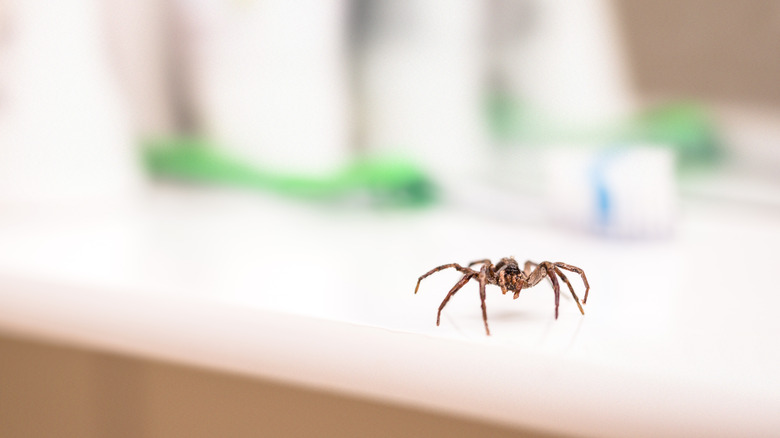Humans Would Face A Fatal Risk If Spiders Didn't Exist
It's understandable why so many people fear spiders. Often used in horror movies to scare audiences, spiders are creepy, crawly, and seem to have an intelligence to them. According to The Conversation, "people have reportedly crashed their cars, set a house on fire, and even caused such a commotion that police showed up" when trying to avoid or kill a spider.
Although bites from certain kinds of spiders like the black widow or the brown recluse can be fatal, these spiders are typically not aggressive unless provoked, according to National Geographic. As of 2014, we knew of about 45,000 different species of spiders in the world (via The Washington Post). With each spider eating different things and having different molecules in their venom that could potentially go on to treat human medical conditions or be otherwise repurposed, the number of ways that spiders protect and help humans is just beginning to be understood.
A spider's nest
Throughout Australia, home to 10,000 spider species and some of the most dangerous spiders in the world, there is one species called the golden orb spider, whose web is spun strong enough to trap small birds and bats (via Australia Museum, Australian Geographic). The Australian huntsman spider can run more than five times as fast as a human, and another species called the bolas spider can throw a slingshot of silk at moths to lasso them into their nests like cattle (via The Conversation).
But don't be alarmed. Typically, spiders use these super-spider powers for good and not evil. In fact, a spider's silk, which is the "strongest, most flexible natural biomaterial known to man," has been repurposed by humans to make bandages and other objects (via The Conversation). Researchers at the University of Queensland are even developing a new form of painkiller from the venom of tarantulas. But the benefits of spiders don't stop there. One of the biggest ways that spiders help humans out is with their webs.
A spider's prey
One of the most common insects a spider finds in its web is the mosquito, the most deadly animal to humans in the world, with modest estimates suggesting they kill more than 700,000 people per year and account for 17 percent of the world's infectious diseases (via The Conversation, ISGlobal). In addition to mosquitoes, spiders also trap pests that ruin crops in their webs (via The Washington Post). According to the International Maize and Wheat Improvement Center (CIMMYT), "aphids, caterpillars and weevils destroy about one-fifth of the world's total crop production each year."
This sort of spider pest control can therefore be critical in protecting the world's crops, particularly in organic farming, which relies on the balance of natural predators and substances rather than chemical pesticides. Luckily, almost 20 percent of all spider species in North America can be found on U.S. croplands (via The Washington Post). In an interview with The Washington Post, arachnid scientist Norman Platnick said that if spiders disappeared, it would affect our food supply so much that "we would face famine."
Spiders trump pesticides
The U.S. military started using the currently banned pesticide, DDT, during World War II in an attempt to control malaria, according to the National Pesticide Information Center. The widespread DDT campaign was essentially effective in eradicating malaria in the U.S. and was deployed in other countries around the world, according to the Journal of Military and Veterans' Health (JMVH). However, some were skeptical about the chemical's use in agriculture, and in 1962, Rachel Carson wrote her groundbreaking book "Silent Spring" to detail how the insecticide gets into the food chain, builds up in fatty tissues, and causes health effects like seizures. Ironically, many species of mosquitoes targeted by the campaign developed resistance to DDT within a decade anyway.
With the newly realized risks that insecticides carried, farmers and environmentalists began looking for alternative ways to keep pests out of crops. According to the Kashmir Observer, the president of China's Hubei University, Dr. Zhao Jingzhao, found that one-sixth of all natural predators of the boll weevil, which is the biggest threat to China's cotton, were spiders. To cultivate more spiders, he planted grassy, branchy areas below the cotton to attract them, ultimately cutting down on chemical use by 80 percent.
Bring in the spiders
There are certain things farms can do to increase the number of spiders on the land. Conventionally, farmers break up the first one-half to 1 foot of soil to make it easier to plant seeds, per CIMMYT. However, this can disrupt the homes of spiders. In a study where scientists compared whether less disruption would increase spiders, CIMMYT noted that the researchers found that "direct seeding into no-till soil" increased not just the amount of spiders but also the number of spider species on the farm (via Agriculture, Ecosystems & Environment). The study supported Dr. Jingzhao's early practices, as well as the natural pesticide practices of many indigenous cultures.
The problem with this strategy is that crops typically don't grow year-round, and the pest control spiders might not have enough to feed on throughout the year. The U.S. Department of Agriculture has even gone so far as to make artificial diets for pest control bugs, although this is an expensive solution (via the USDA Agricultural Research Service).
Humans could face famine without spiders
According to Norman Platnick, boiling down the severity of losing spiders to the world's human population facing famine is a good way to catch our attention. "Spiders are primary controllers of insects. Without spiders, all of our crops would be consumed by those pests," he said, per The Washington Post. Many people still swat at spiders or try to kill them when they get into the home, but the benefits they provide to humans are vastly important.
Spiders and other invertebrates make up 98 percent of animals on the planet, and they are essential in balancing the ecosystems so that the other 2 percent — including human beings — can thrive, according to The Conversation. So the next time you come across a spider, think of all of these reasons you shouldn't kill spiders in your house. It may go on to save you or someone else from a disease-infected mosquito. Maybe it will reduce the pesticides on your fruits and vegetables. Or maybe it will just peacefully return to the sacred silk web it calls home.
